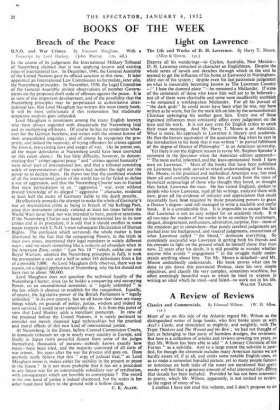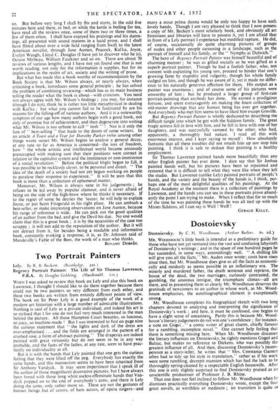A Review of Reviews
MOST of us on this side of the Atlantic regard Mr. Wilson as the distinguished writer of large books, who first broke upon us with Axel's Castle, and stimulated us mightily, and weightily, with The Triple Thinkers and The Wound and the Bow ; we had not thought of him as belonging to that party of harmless drudges, the reviewers. But here is a collection of articles and reviews covering ten years, so that Mr. Wilson has been able to add " A Literary Chronicle of the Forties " as a sub-title. And to a large extent the sub-title is justi- fied, for though the chronicle includes many American names we are hardly aware of, if at all, and omits some notable English ones, so as to make a somewhat lopsided picture, yet so many people famous or notorious on both sides of the water are mentioned that gYery reader will feel that a generous amount of what interested him
that decade has been included. Provided he has not been interested in poetry, which Mr. Wilson, apparently, is not invited to review, to the regret of many of us.
I confess I have not read this volume, and I don't propose to do
so. But before very long I shall by fits and starts, in the odd five minutes here and there, in bed, or while the kettle is boiling for tea, have read all the reviews once, some of them two or three times, a few of them often. I shall have enjoyed his praisings and his damn- ings, all presented with sound reasons in a lucid prose, and I shall have flitted about over a wide field ranging from Swift to the latest American novelist, through Jane Austen, Peacock, Kafka, Joyce, Evelyn Waugh, Lloyd C. Douglas (1 have yet to discover who he is), Octave Mirbeau, William Faulkner and so on. There are about 70 reviews of various lengths, and 1 have not yet found one that is not worth reading, not only for the information it supplies, but for its implications in the realm of art, society and the writing of prose.
But what has made this a book worthy of recommendation by the Book Society is that Mr. Wilson always, or nearly always, when criticising a book, introduces some general principle ; he has solved the problem of combining reviewing—which has as its main business telling the reader what the book is about—with criticism. You need not always agree with Mr. Wilson's findings ; you may, for instance (though I do not), think he is rather too little metaphysical in dealing with Kafka ; but what you cannot fail to be fascinated by are his reasons for the falling-off of various authors. And it is a noteworthy symptom of our age how many authors begin with a good-book, not only of promise but of achievement, and then degenerate into writing what Mr. Wilson is too urbane to call " tosh " ! Nor is it only the lure of " best-selling " that leads to the doom of some writers. In an article A Toast and a Tear for Dorothy Parker (who among other things wrote verse) Mr. Wilson begins to analyse a general decay, at any rate so far as America is concerned—the loss of freedom, how " the whole artistic and intellectual world became anxiously preoccupied with making sure that their positions were correct in relation to the capitalist system and the imminence or non-imminence of a social revolution." Before the political blight began to fall, it was possible to be recklessly clever, to be personal and direct. " The idea of the death of a society had not yet begun working on people to paralyse their response to experience." It will be seen that this book is more than a collection of ephemeral matter.
Moreover, Mr. Wilson is always sane in his judgements ; he refuses to be led away by popular clamour, and is never afraid of being on the side of the high-brow where he thinks it necessary. If to the regret of some he decries the 'teccer, he will help to explain Joyce, or put Scott Fitzgerald in his right place. He can ambush a best-seller, or make interesting observations on Jane Austen, because his range of reference is wide. He can pick out the good qualities of an author from the bad, and give the Devil his due. No one would claim that this is a great book ; it is by the necessities of the case too scrappy ; it will not add to the reputation of the author. But it will not detract from it, for besides being a readable and informative book, constantly evoking a response, it is, as Dr. Johnson said of Mandeville's Fable of the Bees, the work of a man who thinks.
BONAMY DOBREE.







































 Previous page
Previous page